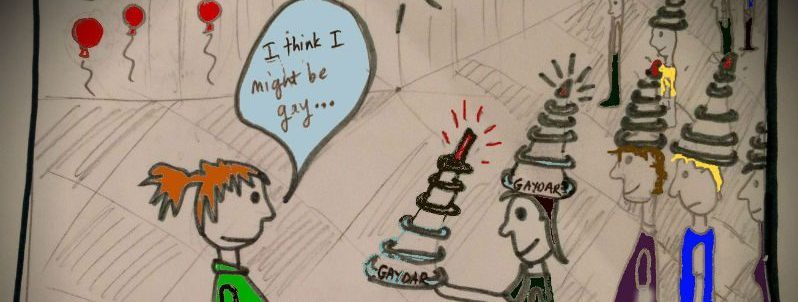Our eldest son has to get regular hearing tests.
It’s a Eustachian tubes thing. You’d think that by now, we wouldn’t cringe every time the lady says, “look a Mommy birdie” and then tells our son the complementary birdcall “must be a daddy birdie.”
“Not in our family!” Vicky and I always feel like crying out, fists in the air.
But, most often in life parenting “types” are distinguished by gender, and limited to: male, or female. An internal voice comes from (somewhere?), pats our shoulder and says,“Let it go, Elsa.”
Is this passing? Is this failing to take up the fight of gender fluidity? (I really hope not, and I equally hope that you’ll call me out on it if it is.)
At one time in my life, “Gaydar” was not a term I knew, but it was easy to understand once I started dating women. All the other stuff that comes with being gay can be more difficult to implement moment to moment—for instance, sometimes it’s hard to navigate how much to correct someone.
There are things I hear on a weekly basis that irk me.
“He looks just like his mother.”
Is it overkill to ask, “Which mother, he has two?” Or do you just take the compliment and move on?
My fair skinned wife is getting rather tired of the grocery store assumptions about our olive-skinned youngest: “He must look just like his Dad!”Questioning the balance between assertion and combativeness, we often hold back from saying, “Actually, he looks exactly like my wife.”
In your life there may be a person you see with some frequency. Perhaps they feel tired of what they see as a “gay agenda.” You know what they mean by this only because before you can respond to an incident, you feel their eyes roll; it starts with a slow shrug in their shoulders and flushes right up into a sigh that escapes somewhere in their forehead.
These kind of “here we go again” responses can make you doubt the efficacy of your message. (Are these the very people who should keep hearing it? Or are they weary because they see this as a preaching-to-the-converted moment?)
We try to balance the fusillade of heterosexist comments toward our family, or our life, with a desire to save the message for when it counts most; such as, when people use the word “dad” instead of “donor”. My friend H. says the response is simple: “When you’re around our family, we use the word donor. Not the word ‘Dad’, ‘donor.’” She has a way of squaring out these two sentences with her hands, getting to the bottom of the box with two hard fast hands for a real, ‘end of story’ message.
Sometimes teaching other people the language to talk about your family goes well (e.g. “I’m really sorry, you will never hear that from me again”); and sometimes it feels like your voice squeaks out, “donor” because you feel more incredulity and disbelief than an ability to be level headed.
I’ve had this “donor” conversation with a particular person I care about a number of times, so when it happens again, sometimes I find myself fumbling with the edges of the table cloth and feeling annoyed rather than automatically coming out with the appropriate (loving) response.
If you hit them on the head with your message, their reciprocated hurt could cause further harm to the relationship.
Is it possible that sometimes an innocent, “he looks just like his mother” is not a slight to our family structure? Technically I am ‘mother’ to both our boys, even though they don’t call me by that name, and there are two ‘mothers’. I’m not sure if reckoning this will stop the hairs prickling on my neck, but it’s a delicate balance of two extremes.
On one hand I am trying to avoid passing, and instead, contribute to making the world more gay friendly for my kids and contemporaries.
On the opposing hand, I am trying to avoid insisting that sympathisers—worse, fellow advocates—lick the dead horse’s blood off the floor. I wish there was some kind of gauge that is as easy to pick up as Gaydar for knowing when to step up and when to shut up.
